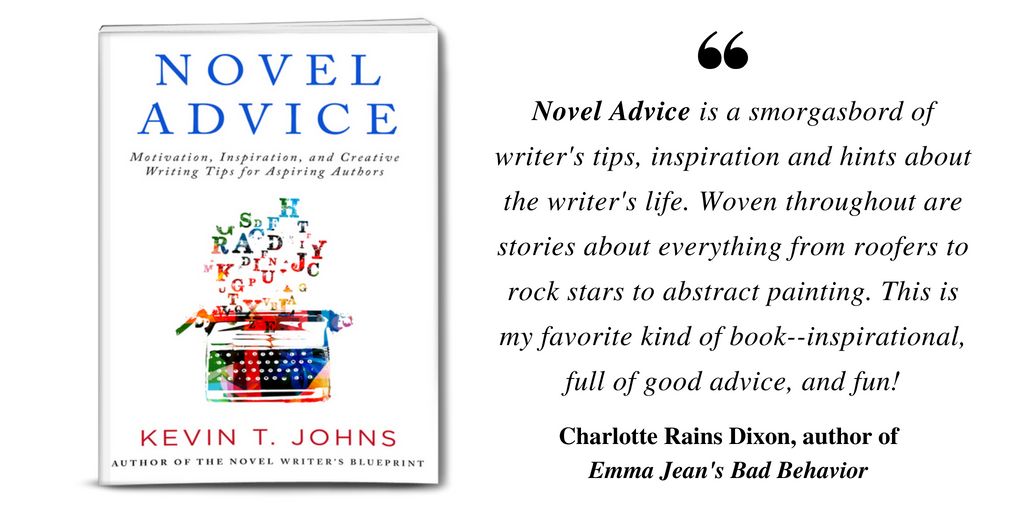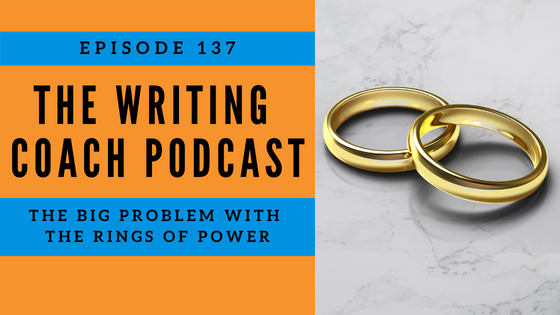Amazon’s billion-dollar streaming series The Lord of the Rings: The Rings of Power has now been released . . . and it’s not very good.
In this episode of The Writing Coach podcast, I explain the biggest problem with the show (Hint: it’s writing-related) and then describe how you can avoid making the same mistakes when developing and drafting your fiction writing.
Listen to the episode or read the transcript below:
The Writing Coach Episode #137 Show Notes
Get Kevin’s FREE book: NOVEL ADVICE: MOTIVATION, INSPIRATION, AND CREATIVE WRITING TIPS FOR ASPIRING AUTHORS.

The Writing Coach Episode #137 Transcript
Hello, beloved listeners and welcome back to The Writing Coach podcast. It is your host as always writing coach Kevin T Johns here.
Like most writers out there, like most people out there. I love Lord of the Rings. I love the books, and I love Peter Jackson’s films. And so when it was announced that Amazon was going to be making a Lord of the Rings television series that they were going to spend a billion dollars on. I was tentative. Like a lot of people, you know, you hope they don’t screw it up <laugh>, but I was also really open-minded and even looking forward to seeing what they came up with.
Unfortunately, however, the series has come out, and like a lot of people, I don’t really like it. And I would say the biggest problem with the series is a writing-related problem. And that’s why I want to talk about it on the show today.
This is a really important issue that I think you want to keep in mind as a writer when you are creating your protagonists. And the issue is that the show’s protagonist Galadriel is completely unlikeable. Within the first 20 minutes of the first episode, she’s revealed to be arrogant, standoffish, selfish, unwilling to consider other people’s opinions, disrespectful of authority figures, and also seems not to care about the lives that she’s responsible for as a leader, willing to risk soldiers reporting to her in order to achieve her own mission.
Many people have commented on this issue of how insufferable the character is to the point that Amazon this week has now issued a public statement saying, you know, hang in there, she’s on a character arc. And you know, we all assume she’s going to learn some humbleness at some point. Well, good. You know it’s kind of shocking that a corporation needs to issue a press release assuring its audience, that the character is on an arc. Every good character, every protagonist should be on an arc of some kind, so that doesn’t exactly comfort me in any way.
And here’s the other problem: giving Galadriel an arc does not solve the problem that they have created because character arc is not supposed to be about taking an unlikeable character and making them likable over the course of their story. It’s about taking a likable character and making them even more likable over their growth in transformation.
So let’s talk about character art for a little bit. Here, here is how character arc works: In our character’s backstory they suffer some sort of wound or trauma that gives them a misunderstanding about themselves or about the world that they live in. So they begin the story flawed in some way. Then over the course of the narrative, they learn scales and they overcome obstacles. And in the process, they realized that they were wrong either about themselves or about the world or about both.
Let’s use Harry Potter in the first Harry Potter book. As an example, in Harry’s backstory, we learned that his parents were murdered and that as a result, he’s been raised to believe he isn’t magical and that there is no magic in the world. Of course, over the course of the first book, he comes to discover that he is wrong, magic does exist. And he actually plays a very important role in this magical world. But unlike glad in The Rings of Power television series, Harry is likable to begin with because he’s the underdog right away in the book. We see that everyone mistreats him and yet he still seems to be a decent person. He seems to care about others. He isn’t totally self-centered like Galadriel.
So one of the important things about character arcs is that the flaws that our characters start, the story with is supposed to make them likable and relatable.
We instantly like Harry Potter because he’s down and out. When we meet him, unlike Galadriel who starts The Rings of Power seeming to have a lot of authority, seeming to be a more skilled fighter than anyone around her. She seems to know more and be more determined than anyone else in the story.
Now, can we have a character where their flaw is related to their own self-inflated ego and have the story still work and have the character be likable? Absolutely. For example, let’s look at the very first Thor film. When we meet the superhero Thor for the first time in that film, he’s arrogant, he’s war hungry. He’s eager to do battle just like Galadriel when we meet her in The Rings of Power, except there’s one major important difference. Thor is charming. He’s dynamic. He’s interesting and fun to watch. He has a group of friends who he respects and cares about.
Yes, he’s cocky. And the arc of his story is that he needs to learn humbleness, but he’s likable to begin with. Even with his flaws, the viewer wants to join him on this journey. He’s going to go on because the reality is, people love confidence. We are attracted to confident people, even if those people are flawed.
So yes, Thor needs to learn humbleness and, yes, Thor is flawed, but he’s having fun. And he’s fun to watch. We like him. Galadriel on the other hand is flawed in her arrogance, but she looks absolutely miserable throughout the story. There’s nothing at all about her to draw the viewer in. She isn’t dynamic. She isn’t charming. She isn’t likable. Can an overly confident character be enjoyable? Absolutely. But there’s just nothing enjoyable about the Galadriel that they’ve given us. She’s bland in her self-centeredness.
The benefits of a character who is perhaps arrogant and doesn’t care what others think about them are that they’re able to do whatever they want. And as a result, they’re supposed to have fun in doing it. We can look at something like Oliver stone and Quentin Tarantino’s film, Natural Born Killers. The protagonists of that film are totally psychotic mass murderers, hugely flawed characters, and yet were drawn into the story. And we’re willing to follow their journey because in their rejection of society’s norms, they’re able to have fun. They do whatever they want.
And so we should be able to live vicariously through characters who only follow their own rules and in doing so, get the fun of experiencing what it would be like to be one of those people.
If not that, then we should at least be able to laugh at the arrogance of their character. Let’s look at something like the television series, The Office, both the British version and the American version on both those shows.
The boss is hugely flawed in that he’s arrogant in thinking he’s much funnier than he actually is. And so we, as an audience, get joy out of watching him be a buffoon. It’s fun to watch him because he thinks he’s funnier than he is.
Unfortunately, there’s nothing fun about Galadriel at all in The Rings of Power. She doesn’t even crack a smile, let alone do anything that allows us to laugh at her ridiculous overconfidence. Will she become a more likable character If indeed she does go on to learn humbleness? Certainly, she will. But here’s the problem: As we just talked about a few episodes ago in my episode about writing in streaming television series, these super short prestige format six-episode seasons simply do not provide enough time for this sort of character development to happen. We are three episodes into The Rings of Power already as I record this and there are only six episodes in the season. The show is half over! Let’s say magically Galadriel learns humbleness and becomes super likable in episode four . . . I doubt it’s gonna happen, but even if it does, she still spent 50% of this entire first season as an utterly unlikable and off-putting character.
Please don’t do this with your characters. Yes, we want your protagonist to go on an arc and in order to do so, we want our characters to be flawed or wounded at the beginning of your story. But ideally, that flaw is going be related to their disbelief in themselves and their capabilities. We as readers want to believe in them and know that their capable of greater things than they originally see in themselves, going back to Lord of the Rings. This is why we love Sam and Frodo so much. They don’t think they’re the bomb.
They don’t think they know better than everyone else. They’re just humble people who rise to the occasion and ultimately learn how heroic they can be. And that’s why we love them.
If you are going to write a character whose flaw is that they’re self-centred and overly confident, please ensure you do it in a way that at least makes the character fun, charming, exciting, and dynamic. Do not do what Amazon and the creators of The Rings of Power have done. Please do not spend a billion dollars to buy a legendary franchise and then create a television series about a character who nobody likes or relates to.
All right, that is it for this episode. Thank you so much for tuning in.
I have a free book over on my website. It’s called Novel Advice: Motivation, Inspiration, and Creative Writing Tips for Aspiring Authors. I want to give you that book for free. Head on over to www.kevintjohns.com and and you’re going to want to do that as soon as possible. Next week, I am going to have a big announcement for my subscribers. And so you want to make sure that you are on that mailing list when that announcement goes out.
Thank you so much for listening to this episode and I will see you on the next episode of The Writing Coach.
Podcast: Play in new window | Download
Subscribe: Apple Podcasts | RSS






